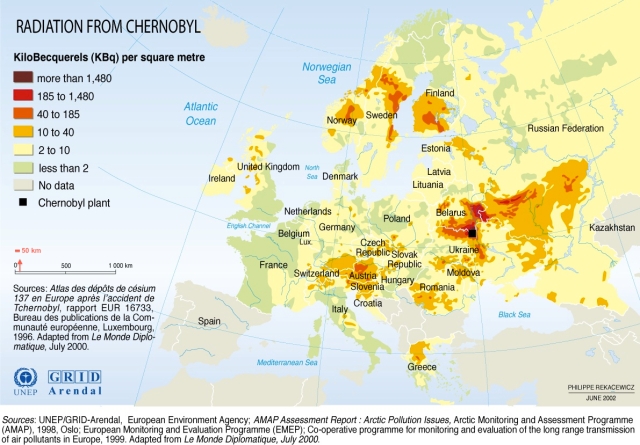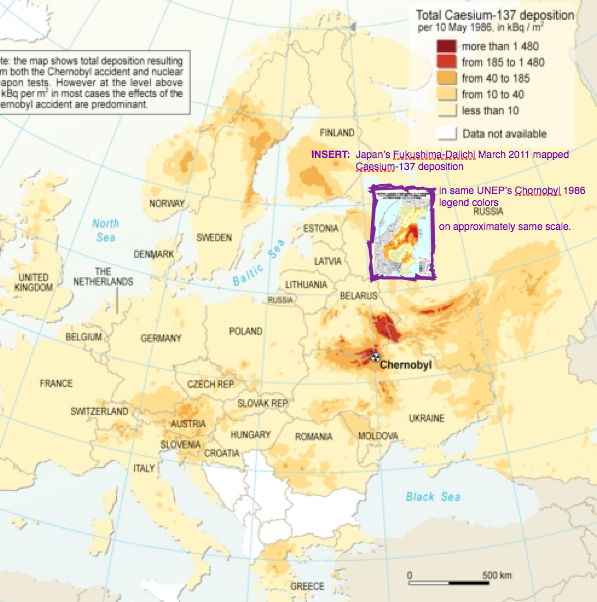Ccgwebmaster :
You see the end of the world everywhere !!!?
No, but in many instances I've encountered people who think Fukushima might be, or that play it up a lot more than it really merits.
No, I just care for a bunch of people who will eat some fishes in the years to come and they will die from a cancer later on earlier than what they would normally do that's all.
Frankly, given how much damage has been done to the sea by systemic overfishing, I'd be happy for the fish if bioaccumulation stopped people from eating some of them. We've already seriously degraded (and in some respects destroyed) the marine habitat. We routinely expose ourselves to numerous other cancer risks, in some cases by active choice of the individual or society. I can't therefore express much concern for any additional risk from a small increase in radioactivity.
We are talking of a quantity of radioactivity that is astounding nothing too see with natural level. You don't eat or breath cosmic rays...do you ? The radioactivity when absorbed is much more dangerous even at low level.
Unfortunately radioactivity is without odor so not much people will notice !
the dose makes the poison
That's true for radioactivity but as I said when eaten the doses are much lower.
It is not true for some substances like those that you find in the plastics because they mimic our hormonal system (bisphenol A)(certainly radioactivity has got something to play with that ?)
It's more complicated than this. If you ingest (or inhale) a radioactive source the seriousness of that compared to just having it lying around nearby very much depends on how it is decaying. If it is emitting alpha particles (or beta particles) then yes - eating or inhaling it is a rather bad idea and will do a lot more harm. If it's emitting gamma radiation, I don't see that it really makes much practical difference - gamma radiation is capable of going all the way through a human body with relatively limited interaction.
If the radioactive isotope in question is one that can be taken up by the body and incorporated into bones (eg strontium 90 -
http://en.wikipedia.org/wiki/Strontium-90) or iodine 131 (
http://en.wikipedia.org/wiki/Iodine-131) that can accumulate in the thyroid - then yes, you have increased concerns again (the scope for the lungs or body to remove it is taken away).
Even in those two examples quoted above - the risk of iodine 131 is clearly much easier to manage than strontium 90 (look at the difference in half life - iodine 131 will decay much faster to safe levels even following a relatively large release than strontium 90). That has a big effect on dispersion and how far spread they can be before decaying to safer levels. That said - dispersion will in itself tend to reduce the effective radioactivity by spreading the material out over a larger area.
As for cosmic rays - they are energetic enough to punch through nearly anything - including the whole atmosphere. If you went deep enough underground to escape them, you'd be experiencing increased radioactivity due to the natural radioactivity of the earth itself and no better off.
One last time -
my big objection to how people react around Fukushima is that people tend to jump on a bandwagon about how bad it is or will be with limited scientific justification or details.
Here are some examples of the sort of details I think we need - and that would make for a far more informed and accurate discussion in my view:
http://www.sciencedaily.com/releases/2013/06/130611084207.htmThe above link refers to strontium 90 which we have identified is capable of bioaccumulation and has a relatively long half life and therefore is going to hang around for quite a long time. This would seem like a concern to me - certainly it would be important to monitor how much was being released and where it was ending up. The figures mentioned in the link do not seem sufficient to me to merit global concern, but if concentrated in fish in the area might restrict the seafood people could safely eat (assuming the usual conservative levels of safety are applied*)
http://atomicinsights.com/how-much-i-131-and-cs-137-was-released-into-atmosphere-at-fukushima/http://www.tandfonline.com/doi/full/10.1080/00223131.2013.772449#tabModulehttp://www.atmos-chem-phys-discuss.net/11/28319/2011/acpd-11-28319-2011.htmlFrom the last link:
Altogether, we estimate that 6.4 TBq of 137Cs, or 19% of the total fallout until 20 April, were deposited over Japanese land areas, while most of the rest fell over the North Pacific Ocean. Only 0.7 TBq, or 2% of the total fallout were deposited on land areas other than Japan.
If 2% of the total fallout is on land areas other than Japan - and most of Japan is not (yet) an abandoned radioactive wasteland with ten times as much (presumably concentrated onto a smaller land area), how much to worry about so far?
http://www.newscientist.com/article/dn20285-fukushima-radioactive-fallout-nears-chernobyl-levels.html#.Uhawlz95KeYI remember Chernobyl - I was a (fairly young) child at the time, living in Scotland. I didn't really register what had happened at the time (my family didn't even have a TV) but I remember being told not to catch rain drops in my mouth because of it. There were concerns about milk (from dairy) for some time and my parents got powdered milk for a little while on account of that. Some sheep in Scotland were declared off limits for human consumption (and indeed some of these weren't declared safe again for a couple decades). I think it's fair to say the only people who really directly suffered were farmers who had their animals declared unsafe for human consumption.
So with all due respect, and I'm sure other people on this forum can say exactly the same thing - but I've already
had the experience of living downwind from a major nuclear disaster - and while Fukushima might be releasing more radioactive material than Chernobyl - Chernobyl was arguably worse in that the material went into the atmosphere rather than the ocean and the downwind area included a large swathe of continental Europe.
There are some good fall out maps here, looks like:
http://allegedlyapparent.wordpress.com/2011/09/30/extended-fukushima-fallout-maps-sept-29-mext-release-fukushima-vs-chernobyl-2/I'd like to refer specifically to:

So in Scotland - I was potentially living in one of those 10-40 KBq/m^2 areas... (light orange). Consider that for a moment - then work out what 2% of Fukushima dispersed across whatever land surfaces outside of Japan it has come down on looks like?
Here is a comparison with Fukushima to scale (with the caveat that it only seems to be covering caesium 137):

The actual land fall out from Fukushima would appear to be greatly restricted geographically. Dispersing radioactive material into the oceans has the advantage that it will dilute it far more as it can mix into the volume, versus dusting the land where it will remain near to the surface of the area it falls onto.
Why, oh why, can't people get as concerned about climate change and carbon dioxide as they do about nuclear technologies? (a general complaint, I appreciate the vast majority here are fairly up to speed on climate change risks)
* I'd like to note that with radioactivity, for some reason, people seem to usually manage to apply very conservative levels of safety, very different from climate change. A worker in a nuclear plant can use up their permitted work dosage for a year by flying with their badge on. If even a tiny increase in cancer is a basis for setting a safe limit - the safe limit is still very conservative, especially compared to that we seem to be playing with for atmospheric carbon dioxide.
